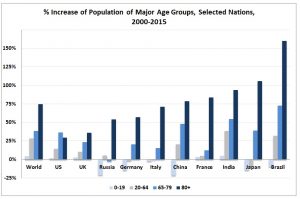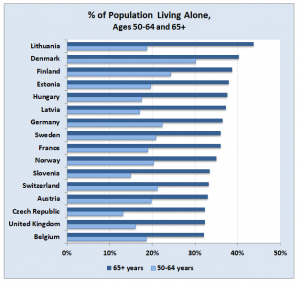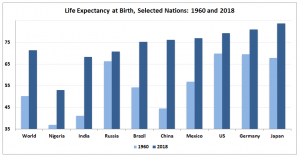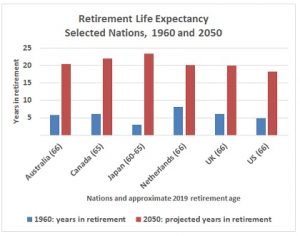The Costly Blessings Of Old Age – Analysis
World’s aging trends, powerful and irreversible, require serious rethinking of pension, health and long-term care programs .
By Joseph Chamie*
The fastest growing age groups worldwide are the elderly. While living to old age is certainly a blessing, the growing numbers of old people aged 65 years and older – 700 million today and exceeding 1.5 billion by midcentury – pose challenges for governments and families.
Rising costs of medical treatment and health care for the rapidly expanding pool of longer surviving elderly together with burgeoning needs for financial assistance and long-term care strain government resources and overwhelm family budgets, capacities and hopes.

Improved health care contributes to declining fertility rates and higher life expectancies, ensuring an older population. Since the beginning of the 21st century, the global populations in age groups 65 to 79 years and 80 years and older grew by 38 and 75 percent, respectively, while those aged in the age groups 20 to 64 years and under 20 years increased by 29 and 4 percent, respectively.
Longer lifespans mean many elderly outlive their savings or pensions. With an extra decade or more of life, pension systems must pay benefits up to three times longer than was planned during the 20th century, notes the World Economic Forum.
The numbers of the elderly are especially striking for certain countries. In Brazil, China, Germany, Italy, Japan and Russia, for example, the numbers of those aged 80 and older increased by more than 50 percent between 2000 and 2015 while those under 20 years old declined. Population aging trends will continue throughout the 21st century. By 2050, demographers project that the elderly in some 40 countries will account for at least a quarter of their populations. And in China, Germany, Greece, Japan, Iran, Italy, South Korea and Spain, one in three people is expected to be aged 65 years and older.
The majorities of the elderly in virtually all countries are women, with the proportions increasing at older ages. Globally the proportions of women in age groups 65 to 79 years and 80 years and over are 55 and 62 percent, respectively, with the highest proportions observed in Eastern European countries. In Belarus, Russia and the Ukraine, for example, women account for approximately two-thirds of those aged 65 to 79 and three-fourths of those aged 80 years and over.
Increased longevity is reducing the number of workers per retiree, increasing tax burdens on workers who support various government programs for the growing numbers of retired people. The elderly generally wish to remain in their homes as long as possible. And as they transition into old age, people, especially women, often find themselves living alone in single-person households, increasing the risks of poverty and social isolation. In most European countries, for example, at least one-third of the elderly lives in one-person households. In Japan, kodokushi – 孤独死 or lonely death – has become a vexing problem for the country with the old dying alone and remaining undiscovered sometimes for years. While one estimate puts the annual number of lonely deaths at 30,000, others say suggest the actual number could be three times higher.

The rise in single-person households can shape local economies, increasing demand for small homes and appliances, domestic staff, nearby convenience stores and processed food. A report from South Korea suggests that consumption rises, with the average monthly expenditure of single households about 1.7 times higher than that of multi-person households with spending shifts from education and entertainment to health services.
Financing and provision of long-term care for the elderly is an enormous challenge for societies. Public provisions for care are not comprehensive in many developed countries and remain largely unavailable in most developing countries. Soaring numbers of elderly stress traditional safety nets, including local communities, families and friends. This highlights unpaid caregiving as a policy issue. Caregivers, mostly women, provide financial assistance and care to elderly in need with limited recognition. While emotionally rewarding, the work can be disquieting and burdensome, interrupting careers and harming personal wellbeing.

Compounding the stress for families and caregivers is dementia – which affects about 10 percent of adults aged 65 years and older and nearly 30 percent of those 85 years and older. Irrespective of region, projected numbers of dementia cases – with Alzheimer’s disease and vascular dementia being the two most common causes – are expected to rise dramatically in the coming decades. While some recent studies report reductions in dementia’s prevalence, it nevertheless remains a challenge for those afflicted, family members and government health programs.
The increased needs and costs of long-term care and support for the elderly focus government and public attention on a critical question – whether such care should be primarily a public or private responsibility. The first level of responsibility, some maintain, rests with individuals, who should plan ahead for old age, taking charge of their finances and personal health while understanding their rights and responsibilities.
Next, families, especially adult children, are viewed as having a moral obligation to care and provide financial assistance for elderly parents in need. Given that their parents took care of them when they were children, many analysts contend it is reasonable for communities to expect adult children to care for parents as necessary.

Others contend that the government has a primary responsibility to provide a safety net – given the decline of the traditional family, many adults remaining childless, high health and long-term care, costs, increasing longevity and the considerable taxes one pays to government over a lifetime. Government officials are typically reluctant to tackle the politically sensitive and costly issue of the long-term care of the growing elderly population, often choosing to postpone actions to the distant future. Even so, citizens in most countries are aware of the population aging issue and the consequences. Majorities in China, Germany, Japan, South Korea, Spain and other nations consider the growing number of older people to be a major problem.
Views on the care of the elderly have shifted from historically a family responsibility to governments in the modern era taking on the role. Nevertheless, many countries, including Bangladesh, China, France, Germany, India and Singapore, as well as some US states, have filial laws that hold adult children responsible for supporting dependent elderly parents.
The world’s most populous nations confront the aging rise. In China, Article 47 of the constitution states that adult children have “the duty to support and assist their parents.” More recently, the Chinese government adopted the Elderly Rights Law mandating children living apart from elderly parents to visit aging parents regularly, with the aim of providing material and emotional support. Adult children who fail to make such parental visits face potential punishment ranging from fines to jail time. The Indian government passed the Maintenance and Welfare of Parents and Senior Citizens Act in 2007 – needy parents and grandparents can seek monthly maintenance up to ₹10,000, about US$140, from children. Recently, the government proposed an update that increased the jail term from three to six months for abandoning or abusing parents and discarded the upper limit for maintenance.
Powerful, irreversible demographic trends add to population aging with growing numbers and proportions of people, especially women, living more years in old age. Societies may emphasize individual responsibility for health and financial security, but many of the elderly have little choice but to turn to families and governments for costly support. In light of the demographic realities, government policies on the elderly, especially pensions, health benefits and long-term care, require serious revamping. Unfortunately, procrastination appears to be the prevailing practice. The longer societies wait, the more costly will be the reckoning.
*Joseph Chamie is a former director of the United Nations Population Division.

